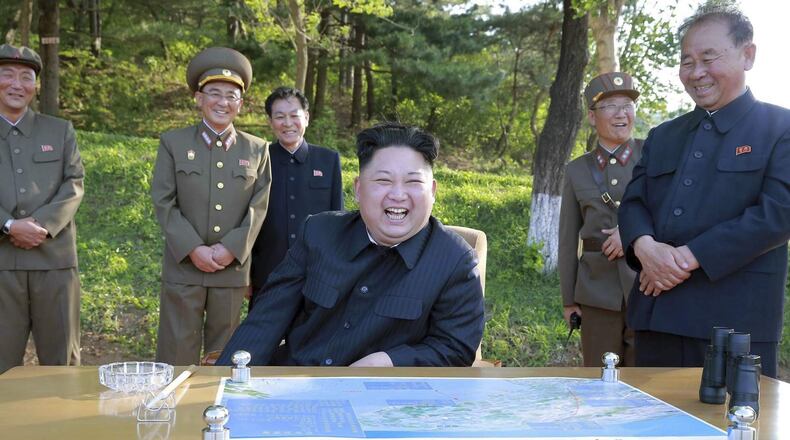A few hours before President Trump’s State of the Union speech, which focused heavily on the threat from North Korea, his administration announced that it was withdrawing the nomination of Victor Cha as U.S. ambassador to South Korea.
Cha, a Korean-American foreign-policy expert who served on the National Security Council under President George W. Bush, knows the region, its challenges and its personalities. He has generally advocated a hawkish approach to North Korea, which would seem to match the approach of the Trump administration, and his nomination had already been approved by the South Korean government. As the English-language Korea Times notes, "It is quite unusual for a pick for ambassador to be withdrawn after the host country approved of the nomination."
So what happened?
In an op-ed published Tuesday in the Washington Post, Cha makes an extraordinary break with the administration. He acknowledges that the threat from North Korea is real, but he also warns that "the answer is not, as some Trump administration officials have suggested, a preventative military strike."
“When I was under consideration for a position in this administration, I shared some of these views,” he writes, which is apparently why he is no longer under consideration.
The withdrawal of Cha’s nomination, and his rush to express his misgivings in a rather blunt op-ed, signal that the Trump administration is considering a military option far more seriously than previously understood.
The idea behind that proposed preventative strike, known as the “bloody nose option,” is to demonstrate American military resolve and power to North Korea and hope that it will force Kim Jong Un to negotiate the surrender of his nuclear arsenal. It’s “Shock and Awe, Part II,” so to speak. However, as Cha writes, “there is a point at which hope must give in to logic.” More precisedly, if we believe that Kim Jong Un is too unstable and unpredictable to possess nuclear weapons, what makes us think that he will respond rationally and predictably to a “limited” military strike against him?
If the North Korean regime struck back, as it almost certainly would to preserve its domestic legitimacy, conservative estimates are that a million South Korean civilians would die in the immediate aftermath. That’s the expected death toll if the reaction is limited to conventional weapons. If the exchange goes nuclear, you can begin to multiply that million dead.
If the North Korean regime then began to collapse, it would in turn create a military and humanitarian crisis on a scale we haven’t seen since the first Korean War. And if U.S. strategy assumes that the war would not get larger, that China would not intervene in the collapse of a communist client state on its own border, well, American strategists made a similar call about Chinese intentions some 68 years ago, and our troops paid quite a heavy price when that prediction proved wrong.
And with China and the United States -- the two biggest economies on the planet -- at war with each other, supply chains would break down and the highly networked global economy would come to a grinding halt.
Now, it’s possible that all this talk and bluster from the Trump administration, including the withdrawal of Cha’s nomination, is part of a highly orchestrated pressure campaign to put fear and uncertainty into the North Korean regime so that it is more prepared to negotiate. If so, fine.
However, it does seem important to note that so far, the Trump administration hasn’t shown the organizational capability, patience and discipline needed to carry out such a well-calibrated foreign policy. Quite the contrary. We’re a year into Trump’s four-year term, the Korean Peninsula is supposedly one of the Trump administration’s highest priorities, yet the crucial post of ambassador to South Korea remains vacant. I have a hard time believing that an administration that can’t handle that basic function is supposed to stage manage a highly complex diplomatic operation that could literally go nuclear if not handled well.
So far, that approach has managed to raise real and fully justified doubts among our South Korean friends about the wisdom of their alliance with the United States. From their perspective, a country that would condemn a million South Korean citizens to death in hopes of pre-empting a highly unlikely attack on its own soil isn’t much of a friend or ally in the first place. Talk of evacuating the 230,000 U.S. citizens in South Korea before taking that action doesn’t help with that perception problem.
To compound the problem still further, the Trump administration has announced as its goal that North Korea surrender its nuclear capability, and suggests that anything less will require military action. That too poses a problem, because the notion that Kim Jong Un is somehow going to be pressured into surrendering his hard-earned nuclear arsenal is naive in the extreme.
Remember, the North Korean nuclear program began under Kim’s grandfather back in 1962; it continued under his father and has now borne its deadly fruit. During that single-minded drive to join the nuclear club, the North Koreans have starved their own people and withstood the most extreme economic sanctions ever imposed, and they didn’t endure all that only to give it away at the negotiating table for things that they could have achieved easily 30 years ago.
So if you’re looking for easy answers or “kinetic” solutions, there are none. And at moments such as this, it is critical to look at our own not-so-distant history and remind ourselves that the cheap testosterone high that seems so tempting to some in the short term always comes a long-term hangover.
About the Author
The Latest
Featured



